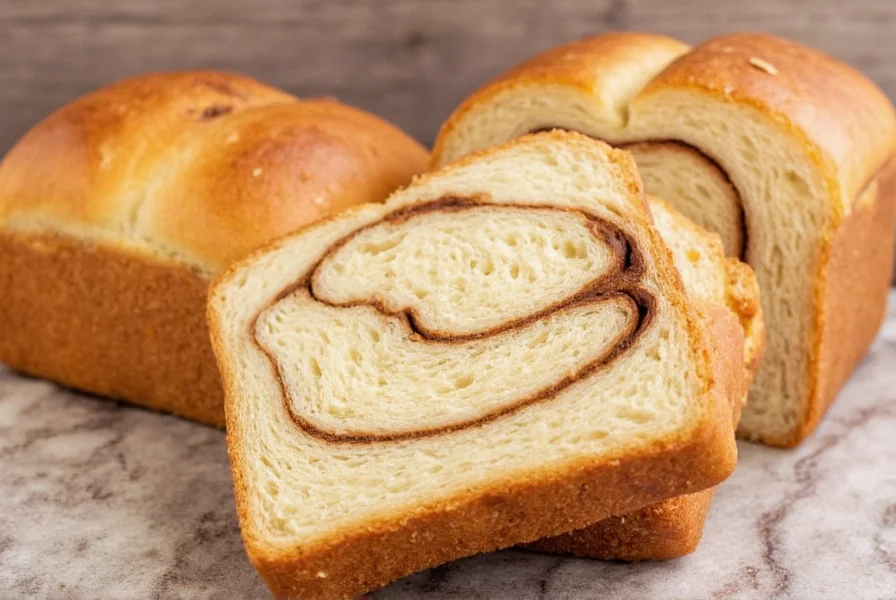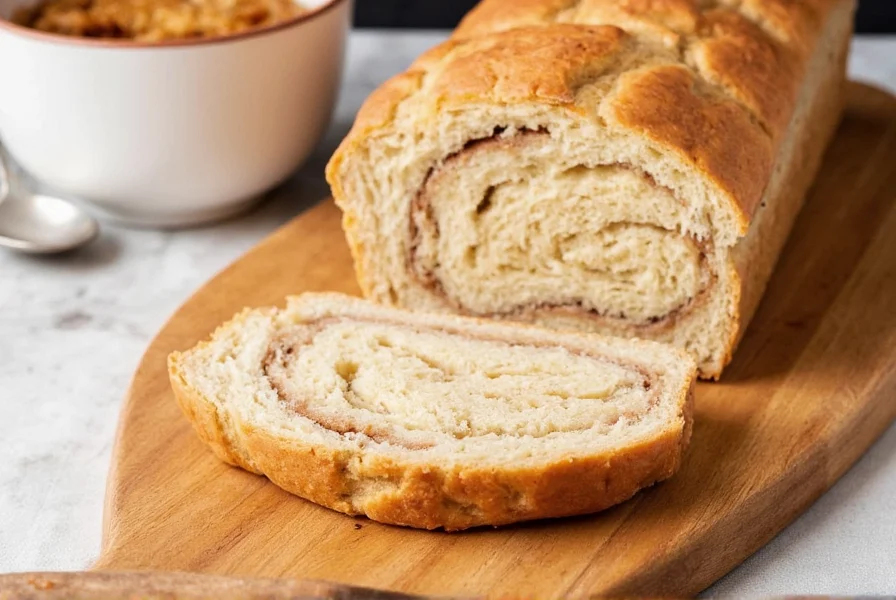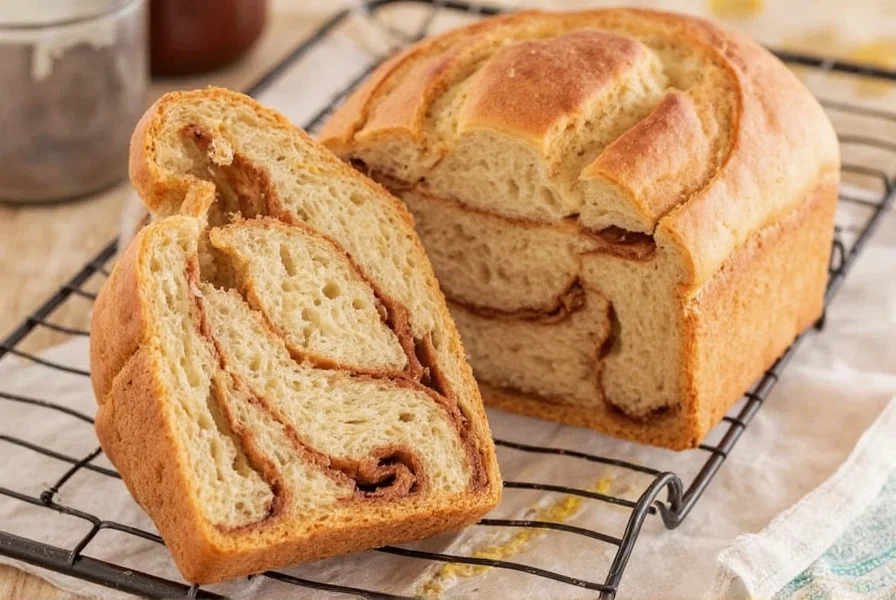The authentic Amish cinnamon bread recipe features a soft, enriched dough swirled with cinnamon-sugar filling, traditionally made without commercial yeast using Amish friendship bread starter. This classic version requires 4 cups all-purpose flour, 1/2 cup sugar, 1/4 cup melted butter, 2 eggs, 1/2 cup milk, 2 tsp cinnamon, and 1/4 tsp salt. The bread bakes at 350°F for 30-35 minutes until golden brown with an internal temperature of 190°F. Key to success is proper dough hydration and not overfilling with cinnamon mixture to prevent leakage during baking.
What Makes Amish Cinnamon Bread Special
Amish cinnamon bread stands apart from regular cinnamon bread through its distinctive preparation method and texture. Traditional Amish communities developed this recipe using friendship bread starter instead of commercial yeast, creating a naturally leavened bread with subtle tanginess. The dough has higher fat content from butter and eggs compared to standard breads, resulting in an exceptionally soft crumb that stays moist for days. Unlike cinnamon rolls which are individual portions, Amish cinnamon bread forms a single loaf with a beautiful spiral pattern when sliced.
Essential Ingredients for Authentic Flavor
The magic of genuine Amish cinnamon bread comes from quality ingredients measured precisely. While some modern adaptations use quick-rise yeast, the traditional version relies on active Amish friendship bread starter for natural fermentation. This starter develops complex flavors during the 10-day cultivation process, giving the bread its characteristic depth.
| Ingredient | Traditional Measurement | Weight Measurement | Notes |
|---|---|---|---|
| All-purpose flour | 4 cups | 500g | Spoon and level method recommended |
| Active friendship starter | 1 cup | 240g | Must be at peak activity |
| Unsalted butter, melted | 1/2 cup | 113g | Cool to room temperature |
| Granulated sugar | 1/2 cup + 1/2 cup | 100g + 100g | Divided for dough and filling |
| Eggs | 2 large | 100g | Room temperature |
| Ground cinnamon | 2 tablespoons | 16g | Freshly ground preferred |
Step-by-Step Baking Instructions
Begin by combining 1 cup active Amish friendship bread starter, 1/2 cup sugar, 1/2 cup melted butter, 2 eggs, and 1/2 cup warm milk in a large mixing bowl. Whisk until smooth, then gradually incorporate 4 cups all-purpose flour and 1/4 teaspoon salt. The dough should pull away from the bowl sides but remain slightly tacky. If too dry, add milk by teaspoon; if too wet, add flour sparingly.
Knead the dough for 8-10 minutes until smooth and elastic. Place in a greased bowl, cover, and let rise in a warm spot for 1-2 hours or until doubled. Proper rising temperature (75-80°F) ensures optimal texture without overproofing.
Roll the risen dough into a 16x12 inch rectangle on a floured surface. Mix 1/2 cup sugar with 2 tablespoons cinnamon, then sprinkle evenly over the dough, leaving a 1/2 inch border. Starting from the long side, roll tightly into a log, pinching the seam to seal. Place seam-side down in a greased 9x5 inch loaf pan.
Cover and let rise 45-60 minutes until the dough crowns about 1 inch above the pan rim. Bake at 350°F for 30-35 minutes until golden brown and internal temperature reaches 190°F. Cool in pan for 10 minutes before transferring to a wire rack.

Avoiding Common Baking Mistakes
Many home bakers encounter issues with Amish cinnamon bread due to improper technique. Overfilling with cinnamon-sugar causes leakage during baking - use exactly 1/2 cup mixture for proper distribution. Dough that's too cold won't rise properly, while overheated milk kills the starter culture. Always test milk temperature with your wrist - it should feel warm but not hot.
The most reliable doneness test combines visual cues (golden brown top) with internal temperature (190°F). Underbaked bread collapses when removed from the pan, while overbaked loaves become dry and crumbly. Allow proper cooling time before slicing - cutting too soon releases steam that should remain in the bread.
Storage and Serving Recommendations
Amish cinnamon bread maintains freshness longer than standard breads due to its enriched dough. Store cooled bread in an airtight container at room temperature for up to 4 days. For extended storage, wrap tightly in plastic wrap and freeze for up to 3 months. Thaw at room temperature before serving.
This versatile bread shines when toasted with butter, but also makes exceptional French toast. Pair with strong coffee or vanilla chai for breakfast, or serve warm with vanilla ice cream for dessert. The subtle sweetness balances perfectly with sharp cheeses for an unexpected savory application.

Adapting the Recipe for Modern Kitchens
While traditional Amish cinnamon bread requires friendship starter, modern bakers can achieve excellent results with active dry yeast. Substitute 2 1/4 teaspoons active dry yeast dissolved in 1/2 cup warm milk with 1 tablespoon sugar for the starter. Allow 10 minutes for the yeast to activate before proceeding.
For dairy-free adaptation, replace milk with unsweetened almond milk and butter with refined coconut oil. Gluten-sensitive bakers can use a 1:1 gluten-free flour blend, though results may vary slightly in texture. Always add xanthan gum (1 teaspoon per cup of GF flour) to improve structure.
Troubleshooting Your Amish Cinnamon Bread
If your bread collapses after baking, the dough likely overproofed during the final rise. Limit final proofing to 60 minutes maximum in a warm environment. For dense texture, check yeast activity - expired yeast won't provide proper lift. When cinnamon filling leaks, you've used too much mixture or didn't seal the roll properly.
Crumbly texture usually indicates insufficient gluten development from under-kneading. The dough should pass the windowpane test - stretch a small piece until thin enough to see light through without tearing. If the bread browns too quickly, tent with aluminum foil during the last 15 minutes of baking.
Frequently Asked Questions
Can I make Amish cinnamon bread without friendship starter?
Yes, you can substitute 2 1/4 teaspoons active dry yeast dissolved in 1/2 cup warm milk with 1 tablespoon sugar. Let it sit 10 minutes until foamy before adding to other ingredients. The texture will be slightly different but still delicious.
Why does my cinnamon filling leak out during baking?
Leaking filling typically happens when you use too much cinnamon-sugar mixture or don't seal the dough roll properly. Use exactly 1/2 cup filling and pinch the seam firmly before placing in the pan. Also ensure your dough isn't too thin when rolled out.
How do I know when Amish cinnamon bread is fully baked?
The bread is done when it reaches an internal temperature of 190°F on an instant-read thermometer, the top is golden brown, and it sounds hollow when tapped. Visual cues alone aren't reliable - always check internal temperature for accuracy.
Can I freeze Amish cinnamon bread?
Yes, wrap cooled bread tightly in plastic wrap followed by aluminum foil. Freeze for up to 3 months. Thaw at room temperature for 2-3 hours before serving. For best results, slice before freezing and toast slices directly from frozen.











 浙公网安备
33010002000092号
浙公网安备
33010002000092号 浙B2-20120091-4
浙B2-20120091-4